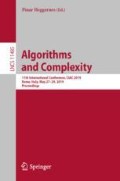Abstract
Hedonic games are a prominent model of coalition formation, in which each agent’s utility only depends on the coalition she resides. The subclass of hedonic games that models the formation of general partnerships [21], where output is shared equally among affiliates, is called hedonic games with common ranking property (HGCRP). Aside from their economic motivation, HGCRP came into prominence since they are guaranteed to have core stable solutions that can be found efficiently [2]. Nonetheless, a core stable solution is not necessarily a socially desirable (Pareto optimal) outcome. We improve upon existing results by proving that every instance of HGCRP has a solution that is both Pareto optimal and core stable. We establish that finding such a solution is, however, \(\mathsf {NP}\)-\(\mathsf {HARD}\), by proving the stronger statement that finding any Pareto optimal solution is \(\mathsf {NP}\)-\(\mathsf {HARD}\). We show that the gap between the total utility of a core stable solution and that of the socially optimal solution (OPT) is bounded by |N|, where N is the set of agents, and that this bound is tight. Our investigations reveal that finding a solution, whose total utility is within a constant factor of that of OPT, is intractable.
This work is supported by The Scientific and Technological Research Council of Turkey (TÜBİTAK) through grant 118E126.
Access this chapter
Tax calculation will be finalised at checkout
Purchases are for personal use only
References
Dreze, J.H., Greenberg, J.: Hedonic coalitions: optimality and stability. Econometrica 48(4), 987 (1980)
Farrell, J., Scotchmer, S.: Partnerships. Q. J. Econ. 103(2), 279 (1988)
Aziz, H., Brandt, F., Harrenstein, P.: Pareto optimality in coalition formation. Games Econ. Behav. 82, 562–581 (2013)
Ballester, C.: NP-completeness in hedonic games. Games Econ. Behav. 49(1), 1–30 (2004)
Gale, D., Shapley, L.S.: College admissions and the stability of marriage. Am. Math. Mon. 69(1), 9 (1962)
Irving, R.W.: An efficient algorithm for the stable roommates problem. J. Algorithms 6(4), 577–595 (1985)
Shenoy, P.P.: On coalition formation: a game-theoretical approach. Int. J. Game Theory 8(3), 133–164 (1979)
Olsen, M.: Nash stability in additively separable hedonic games and community structures. Theory Comput. Syst. 45(4), 917–925 (2009)
Bogomolnaia, A., Jackson, M.O.: The stability of hedonic coalition structures. Games Econ. Behav. 38(2), 201–230 (2002)
Aziz, H., Brandt, F., Seedig, H.G.: Computing desirable partitions in additively separable hedonic games. Artif. Intell. 195, 316–334 (2013)
Banerjee, S., Konishi, H., Sönmez, T.: Core in a simple coalition formation game. Soc. Choice Welf. 18(1), 135–153 (2001)
Elkind, E., Wooldridge, M.: Hedonic coalition nets. In: The Proceedings of AAMAS 2009, vol. 1, pp. 417–424 (2009)
Monderer, D., Shapley, L.S.: Potential games. Games Econ. Behav. 14(1), 124–143 (1996)
Koutsoupias, E., Papadimitriou, C.: Worst-case equilibria. Comput. Sci. Rev. 3(2), 65–69 (2009)
Anshelevich, E., Dasgupta, A., Kleinberg, J., Tardos, É., Wexler, T., Roughgarden, T.: The price of stability for network design with fair cost allocation. SIAM J. Comput. 38(4), 1602–1623 (2008)
Karp, R.M.: Reducibility among combinatorial problems. In: Miller, R.E., Thatcher, J.W., Bohlinger, J.D. (eds.) Complexity of Computer Computations. The IBM Research Symposia Series, pp. 85–103. Springer, Heidelberg (1972). https://doi.org/10.1007/978-1-4684-2001-2_9
Bellare, M., Goldwasser, S.: The complexity of decision versus search. SIAM J. Comput. 23(1), 97–119 (1994)
Dyer, M., Frieze, A.: Planar 3DM is NP-complete. J. Algorithms 7(2), 174–184 (1986)
Bazgan, C., Escoffier, B., Paschos, V.T.: Completeness in standard and differential approximation classes: Poly-(D)APX- and (D)PTAS-completeness. Theor. Comput. Sci. 339(2–3), 272–292 (2005)
Alimonti, P., Kann, V.: Some APX-completeness results for cubic graphs. Theor. Comput. Sci. 237(1–2), 123–134 (2000)
Larson, A.: What Is a Partnership. Expertlaw.com (2018). https://www.expertlaw.com/library/business/partnership.html. Accessed 28 Oct 2018
Crescenzi, P.: A short guide to approximation preserving reductions. In: Proceedings of Computational Complexity. Twelfth Annual IEEE Conference (1997)
Nisan, N., Roughgarden, T., Tardos, E., Vazirani, V.V. (eds.): Algorithmic Game Theory (2007)
Author information
Authors and Affiliations
Corresponding author
Editor information
Editors and Affiliations
Rights and permissions
Copyright information
© 2019 Springer Nature Switzerland AG
About this paper
Cite this paper
Caskurlu, B., Kizilkaya, F.E. (2019). On Hedonic Games with Common Ranking Property. In: Heggernes, P. (eds) Algorithms and Complexity. CIAC 2019. Lecture Notes in Computer Science(), vol 11485. Springer, Cham. https://doi.org/10.1007/978-3-030-17402-6_12
Download citation
DOI: https://doi.org/10.1007/978-3-030-17402-6_12
Published:
Publisher Name: Springer, Cham
Print ISBN: 978-3-030-17401-9
Online ISBN: 978-3-030-17402-6
eBook Packages: Computer ScienceComputer Science (R0)

